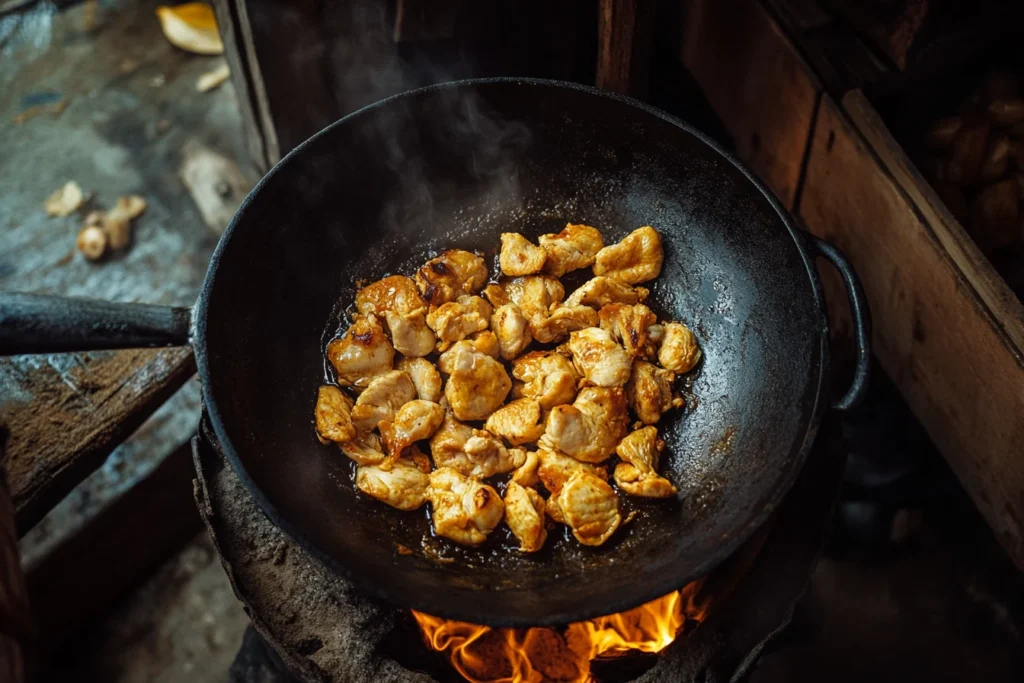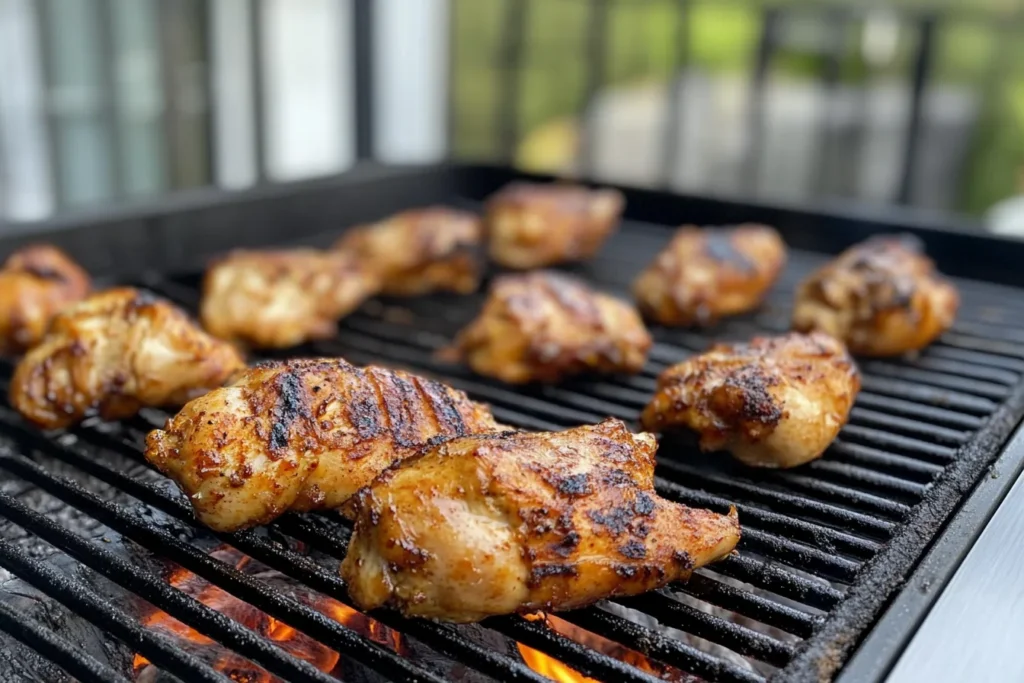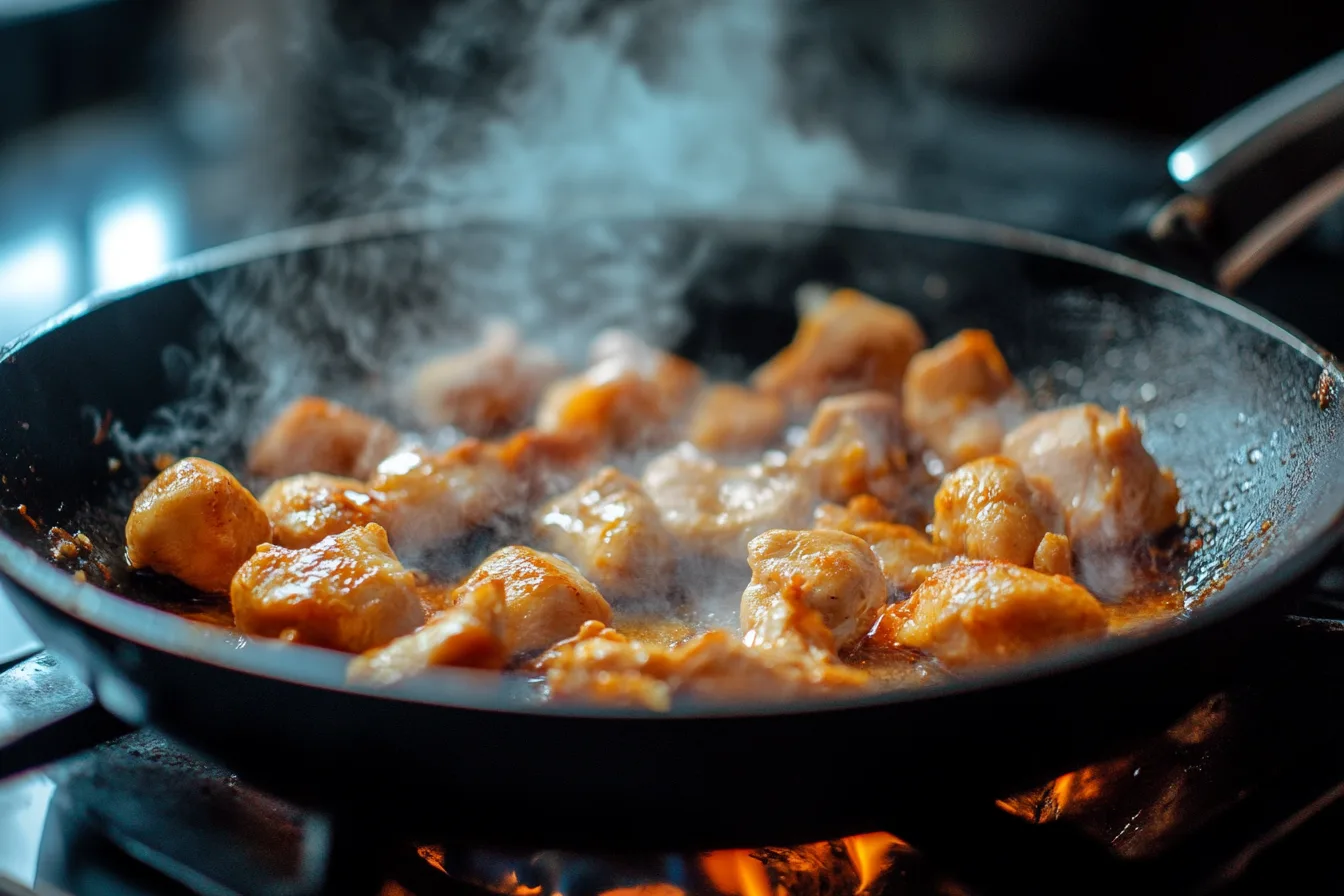Learn the secrets of making chicken pieces tender with these easy-to-follow tips and methods. Ensure your chicken is juicy and flavorful every time.
Introduction: Why Tender Chicken Matters
Have you ever wondered how to make chicken pieces tender? If so, you’re not alone. Perfectly tender chicken is a cornerstone of countless dishes, making it versatile and enjoyable for any meal. Whether you are cooking for your family or preparing a fancy dinner, knowing how to ensure tender chicken pieces can make all the difference.
Chicken can be tough to master if you don’t understand the underlying techniques. Thankfully, with the right methods and a few key ingredients, achieving juicy and tender chicken is easy.
In this article, we’ll dive into everything you need to know about how to make chicken pieces tender, covering several tried-and-true techniques and some additional insights to elevate your cooking game.
Key Ingredients and Tools for Tender Chicken
Before delving into the different methods of tenderizing chicken, it’s essential to understand the key ingredients and tools that help you get there. Here are the basics:
- Chicken Breasts or Thighs: Choose high-quality, fresh chicken pieces. Thighs often stay juicier than breasts due to their higher fat content.
- Marinade Ingredients: Items like yogurt, buttermilk, or lemon juice can work wonders. The acidity helps to break down proteins and tenderize the meat.
- Tenderizer Mallet: Using a meat tenderizer mallet is another effective way to soften the chicken before cooking.
- Salt and Spices: Salt is crucial for breaking down the muscle fibers, which helps in making the meat tender.
- Plastic Wrap: Helps to keep things clean while pounding chicken with a mallet.
Ingredient Notes
- Acidic Marinades: Using an acidic marinade like buttermilk, yogurt, or vinegar-based dressing can significantly improve tenderness. Acids work to break down the proteins in the chicken, leading to a more tender texture.
- Fat: Incorporating fat in your marinade—such as olive oil—keeps chicken pieces moist during cooking, preventing them from drying out.
Techniques on How to Make Chicken Pieces Tender
1. Marinating the Chicken
One of the most popular and effective ways to make chicken pieces tender is by marinating them. Here’s how you can do it effectively:
- Prepare the Marinade: Use an acid base like lemon juice, vinegar, or yogurt, mixed with spices and herbs of your choice.
- Marinate for Optimal Time: Place the chicken in a zip-lock bag or shallow dish and marinate for at least 30 minutes, but ideally up to 24 hours for deeper flavor and more tender meat.
- Keep It Cold: Always marinate in the refrigerator to prevent bacterial growth.
Marinating not only helps with flavor but also makes the chicken incredibly tender. The acid breaks down the proteins, while the oil helps keep moisture inside during cooking.
2. Using a Meat Tenderizer
Another effective way to make chicken pieces tender is to use a meat tenderizer mallet:
- Flatten the Chicken: Place the chicken between two pieces of plastic wrap.
- Pound Evenly: Use the flat side of the tenderizer to pound the chicken until it reaches an even thickness. This step ensures that the chicken cooks uniformly.
- Be Gentle: Avoid over-pounding, as this can cause the chicken to fall apart during cooking.
Tenderizing with a mallet also helps the meat to absorb marinades better, ultimately contributing to its tenderness and flavor.
3. Brining for Extra Moisture
This is a fantastic method to keep chicken pieces moist and tender:
- Prepare the Brine: Dissolve 1/4 cup of salt into 4 cups of water. You can also add herbs, sugar, and spices for additional flavor.
- Submerge the Chicken: Place the chicken pieces in the brine for 30 minutes to 2 hours.
- Rinse and Pat Dry: Once done, rinse the chicken to remove excess salt and pat dry before cooking.

Brining infuses the meat with moisture, preventing it from drying out during cooking. This is especially effective for lean cuts like chicken breasts.
4. Cooking Techniques to Keep Chicken Tender
How you cook the chicken also greatly impacts tenderness. Here are some recommended cooking methods:
Low and Slow Cooking
Cooking chicken pieces low and slow keeps them tender by not subjecting them to high, moisture-stripping heat:
- Braising: Cook chicken in a liquid at a low temperature for a longer time. This method is excellent for tougher cuts, like thighs or drumsticks.
- Slow Cooker: Use a slow cooker to cook the chicken for several hours. The slow cooking ensures that the collagen in the meat has time to break down, leading to ultra-tender results.
Poaching
Poaching is another excellent method to maintain tenderness:
- Heat the Water: Fill a pot with enough water to submerge the chicken pieces. Add aromatics like bay leaves, peppercorns, and garlic.
- Add the Chicken: Once the water is warm, add the chicken and cook gently over medium-low heat.
- Monitor the Temperature: Make sure the water stays at a gentle simmer—never a rolling boil—as boiling can cause the chicken to become tough.
5. Resting the Chicken
Resting cooked chicken is often overlooked but crucial for tenderness:
- Let It Rest: After cooking, let the chicken rest for at least 5-10 minutes before cutting. Resting allows the juices to redistribute throughout the meat, keeping it juicy.
Common Mistakes to Avoid When Making Chicken Tender
Even if you know how to make chicken pieces tender, it’s easy to make a few common mistakes. Here’s what you should avoid:
- Overcooking: Cooking chicken too long will make it dry and tough. Always monitor the internal temperature with a meat thermometer and aim for 165°F.
- Skipping the Marinade: Failing to marinate or brine will lead to less flavorful and potentially drier meat.
- High Heat Cooking: Cooking chicken on high heat, especially lean cuts like breasts, will result in tough, rubbery meat.
Additional Tips and Tricks for Tender Chicken Pieces
- Use Yogurt in Marinades: The enzymes in yogurt are excellent at tenderizing without over-softening the meat.
- Don’t Rush the Resting Process: Resting is just as important as cooking. It keeps the chicken juicy by redistributing moisture throughout.
- Cook in Batches: When cooking a lot of chicken pieces, don’t overcrowd the pan. Overcrowding reduces heat distribution and steams the chicken rather than searing it.

More on the Science of Tenderizing Chicken
Understanding the science behind tenderizing can help elevate your cooking. Proteins in chicken tighten and squeeze out moisture when exposed to heat, which leads to dryness. Methods like marinating, brining, and slow cooking aim to modify these proteins before and during cooking, ensuring that they maintain moisture.
- Acidic Ingredients: Ingredients like lemon juice, buttermilk, and yogurt break down proteins at a molecular level. This process softens muscle fibers, making the meat tender.
- Salt in Brining: Salt in brine denatures proteins, creating gaps that trap water molecules. This keeps the meat moist during cooking.
- Fat in Marinades: Fats, such as oil, coat the meat and create a barrier to prevent it from drying out.
How Different Cooking Methods Impact Chicken Tenderness
The method you use for cooking chicken can drastically affect the outcome. Here are some additional methods that may improve the tenderness of your chicken:
Sous Vide Cooking
Sous Vide involves cooking chicken in a vacuum-sealed bag submerged in water at a precise, controlled temperature. It’s one of the best methods for achieving perfect tenderness:
- Season the Chicken: Lightly season chicken pieces with salt, pepper, and herbs.
- Seal and Cook: Vacuum-seal the chicken in a bag and submerge it in a sous vide bath set to 145°F for 1 to 2 hours.
- Finish in a Pan: After cooking sous vide, quickly sear the chicken in a hot skillet to develop a crispy crust.
Smoking Chicken for Tenderness
Smoking is a low-and-slow cooking method that can keep chicken tender while infusing it with flavor:
- Prepare the Smoker: Preheat your smoker to 225°F.
- Season the Chicken: Use a dry rub or marinade before placing the chicken in the smoker.
- Slow Cook: Smoke the chicken for several hours, maintaining low temperatures to break down muscle fibers slowly.
Best Chicken Cuts for Tenderness
Not all chicken cuts are equal when it comes to tenderness. Here’s a breakdown:
- Chicken Thighs: Thighs are naturally fattier, making them juicier and more forgiving during cooking.
- Chicken Breasts: Lean but can dry out if overcooked. Always marinate or brine for best results.
- Drumsticks and Wings: These cuts are perfect for slow cooking or smoking. They become extremely tender when cooked slowly.
Common Marinades for Tender Chicken
Buttermilk Marinade
- Ingredients: 1 cup buttermilk, 2 cloves garlic (minced), 1 teaspoon paprika, 1 teaspoon salt.
- Method: Mix ingredients in a bowl and marinate chicken for at least 4 hours. The buttermilk’s lactic acid breaks down proteins, resulting in very tender chicken.
Citrus Marinade
- Ingredients: Juice of 2 lemons, 1/4 cup olive oil, 1 tablespoon honey, 1 teaspoon thyme.
- Method: Combine ingredients and marinate chicken pieces for 2-3 hours. The acid from lemon juice works effectively to tenderize, while honey adds sweetness.
Herb and Yogurt Marinade
- Ingredients: 1 cup Greek yogurt, 1 tablespoon mixed herbs (thyme, rosemary, oregano), 1 teaspoon salt.
- Method: Mix and marinate for up to 12 hours for tender, flavorful results.
Frequently Asked Questions
How to Cook a Chicken Gordon Ramsay Style?
Cooking chicken Gordon Ramsay style often involves pan-searing to develop a crispy crust, followed by oven roasting. Gordon Ramsay emphasizes using fresh herbs, lemon, and garlic for added flavor. He also suggests basting with butter frequently to maintain tenderness. For more details, check out our complete guide on How to Cook a Chicken Gordon Ramsay Style.
How to Cook Chicken in Different Styles?
Chicken is an incredibly versatile protein and can be prepared in numerous ways. Here are some popular styles:
- Grilled Chicken: Marinate and grill over medium-high heat until thoroughly cooked.
- Baked Chicken: Coat with spices and bake in the oven at 375°F.
- Fried Chicken: Coat in seasoned flour and fry in hot oil until crispy.
- Stir-Fried Chicken: Cut into small pieces, marinate, and stir-fry over high heat with vegetables.
Each method has its benefits, but remember that cooking times and temperatures will impact the tenderness of the final dish.
How to Cook Ready Made Chicken?
Reheating ready-made chicken without making it dry can be challenging. Here are some tips:
- Oven Reheating: Preheat your oven to 350°F, place the chicken in an oven-safe dish, cover with foil, and heat for 15-20 minutes. Keeping it covered helps retain moisture.
- Add Moisture: Add a bit of chicken broth or water to the dish to help keep it juicy during reheating.
- Avoid Microwaving: Microwaving often leads to dry chicken. If you must use it, do so at a lower power setting and for shorter periods.
Wrapping Up: The Key to Tender Chicken Every Time
Learning how to make chicken pieces tender is a valuable skill that will elevate your cooking game. From marinating to brining, every method shared in this article has its own unique benefits. The key is to choose the approach that fits your time, available ingredients, and cooking technique.
Always remember that quality ingredients, patience, and attention to the little details make all the difference. Whether you’re cooking for family or hosting guests, tender and juicy chicken will always be a hit. Don’t forget to experiment with different marinades and cooking techniques to find your favorite way to make chicken pieces tender.

